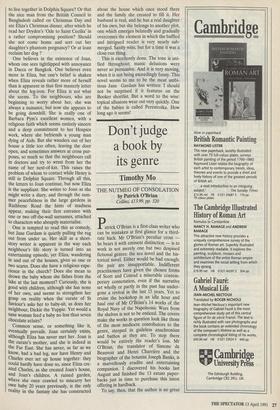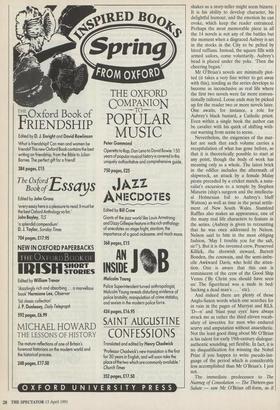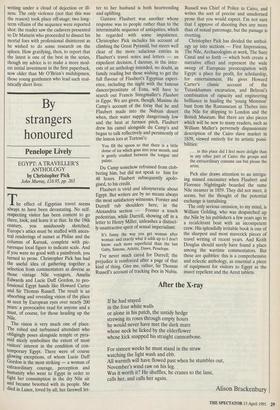Don't judge a book by its genre
Timothy Mo
THE NUTMEG OF CONSOLATION by Patrick O'Brian Collins, f13.99, pp. 320 Patrick O'Brian is a first-class writer who can be mistaken at first glance for a third- rate hack. Mr O'Brian's peculiar cross he bears it with eminent distinction — is to work in not merely one but two despised fictional genres: the sea novel and the his- torical novel. Either would be bad enough; the pair are insupportable. Indifferent practitioners have given the chosen forms of Scott and Conrad a miserable contem- porary connotation, even if the narrative set wholly or partly in the past has under- gone a revival in the last 15 years. Yet to cruise the bookshop in an idle hour and haul one of Mr O'Brian's 14 works of the Royal Navy of the Napoleonic Wars from the shelves is not to be enticed. The covers make the works in question look like those of the most mediocre contributors to the genre, steeped in guileless anachronism and bathos as they are. To stop there would be entirely the reader's loss. Mr O'Brian, the translator of Simone de Beauvoir and Henri Charriere and the biographer of the botanist Joseph Banks, is a marvellously erudite and entertaining companion. I discovered his books last August and finished the 13 extant paper- backs just in time to purchase this latest offering in hardback.
To say, then, that the author is no great shakes as a story-teller might seem bizarre. It is his ability to develop character, his delightful humour, and the emotion he can evoke, which keep the reader entranced. Perhaps the most memorable piece in all the 14 novels is not any of the battles but the moment when a disgraced Aubrey is set in the stocks in the City to be pelted by hired ruffians. Instead, the square fills with armed sailors, come voluntarily. Aubrey's head is placed under the yoke. 'Then the cheering began.'
Mr O'Brian's novels are minimally plot- ted (it takes a very fine writer to get away with this), tending as the series develops to become as inconclusive as real life where the first two novels were far more conven- tionally tailored. Loose ends may be picked up for the reader two or more novels later. One awaits, for instance, a role for Aubrey's black bastard, a Catholic priest. Even within a single book the author can be cavalier with his quirk of shifting with- out warning from scene to scene.
Nevertheless, the exigencies of the mar- ket are such that each volume carries a recapitulation of what has gone before, so that it is theoretically possible to start at any point, though the body of work has meaning only as a whole. The latest brick in the edifice includes the aftermath of shipwreck, an attack by a female Malay pirate preceded by a cricket match, a natu- ralist's excursion to a temple by Stephen Maturin (ship's surgeon and the intellectu- al Holmesian foil to Aubrey's bluff Watson) as well as time in the penal settle- ment of New South Wales. Stamford Raffles also makes an appearance, one of the many real life characters to feature in the series. (Aubrey is given to recounting that he was once addressed by Nelson. Nelson said to him in the most obliging fashion, 'May I trouble you for the salt, sir?'). But it is the invented crew, Preserved Killick, the shrewish steward, Barrett Bonden, the coxswain, and the semi-imbe- cile Awkward Davis, who hold the atten- tion. One is aware that this cast is reminiscent of the crew of the Good Ship Venus (`By Christ you should have seen us/ The figurehead was a nude in bed/ Sucking a dead man's ... ' etc).
And indeed there are plenty of those Anglo-Saxon words which one searches for in vain in the pages of Marryat and RLS. `1D—n' and 'blast your eyes' have always struck me as rather the third eleven vocab- ulary of invective for men who endured scurvy and amputation without anaesthetic. Not the least good thing about Mr O'Brian is his talent for early 19th-century dialogue: authentic sounding, yet flexible. In fact, it is no disqualification for winning the Nobel Prize if you happen to write pseudo-lan- guage of the period which is considerably less accomplished than Mr O'Brian's. I jest
not.
The immediate predecessor to The Nutmeg of Consolation — The Thirteen-gun Salute — saw Mr O'Brian off-form, as if writing under a cloud of dejection or ill- ness. The only violence (not that this was the reason) took place off-stage: two long- term villains of the sequence were reported shot: the reader saw the cadavers presented to Dr Maturin who proceeded to dissect his mortal foes with professional disinterest as he wished to do some research on the spleen. How gratifying, then, to report that the latest is one of the best in the series, though my advice is to make a more mod- est initial investment in the first paperback, now older than Mr O'Brian's midshipmen, those young gentlemen who lead such real- istically short lives.




























































 Previous page
Previous page